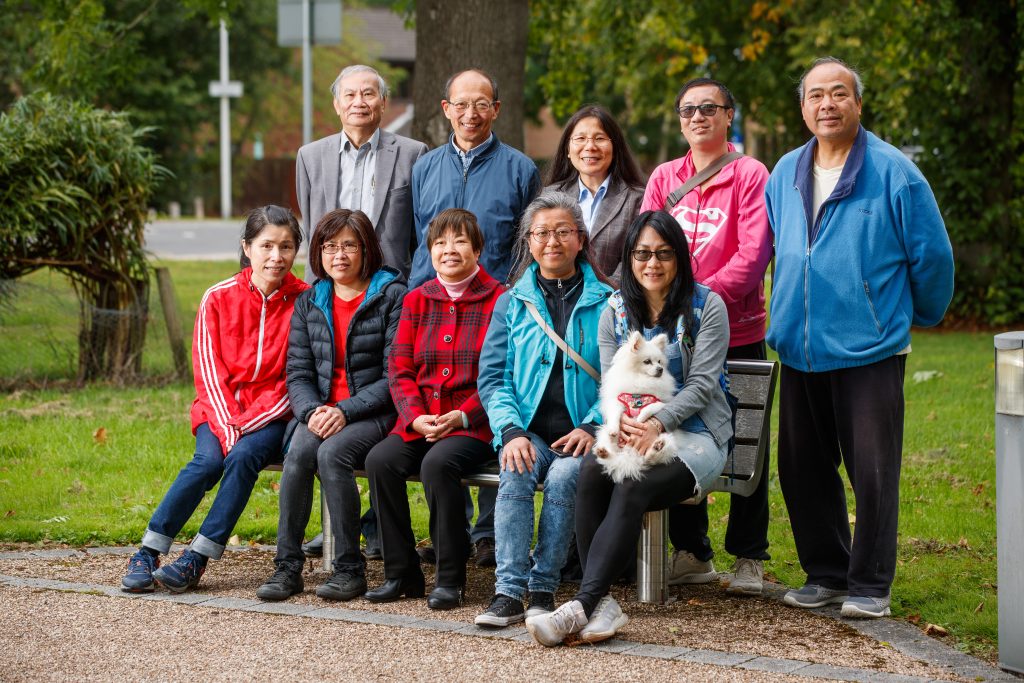Our Chinese Health Project works with the Chinese community in Glasgow and Lanarkshire to raise awareness of hepatitis B and other blood borne viruses like HIV and hepatitis C.

Health Improvement Coordinator Benny Cheng and our Health Ambassadors
Why focus on the Chinese community?
The Chinese community are disproportionately affected by hepatitis B. In Scotland, a third of people living with hepatitis B are from the Chinese community.
Universal hepatitis B vaccinations in China and Scotland have led to a drop in new cases, but there may still be people from the Chinese community who are unaware of their status or who have not received medical treatment or advice in some time, and need support now that they live in Scotland.
What support is available?
If you live in Glasgow or Lanarkshire, are from the Chinese community and live with hepatitis B, we can offer one to one support. We offer support in English, Mandarin and Cantonese.
This support can include access to testing, treatment and vaccination for hepatitis B, support to cope with a new diagnosis and emotional or practical support to live well with hepatitis B. We can also provide access to testing and support services for hepatitis C and HIV.
Additionally, we provide education sessions for Chinese community groups and businesses, and at local events, covering the basics of hepatitis B.
Hepatitis B
Hepatitis B is a virus that affects the liver. There are an estimated 9,000 people in Scotland living with hepatitis B, with people from the Chinese community particularly affected.
The condition can cause serious liver damage (cirrhosis) and cancer, but can be managed well with treatment.
Hepatitis B is passed on through exposure to blood or the body fluids of a person living with the condition.
In Southeast Asian countries and regions, including China, Hong Kong and Malaysia, the most common route of infection is from birthing parent to baby during childbirth.
Hepatitis B can also be passed on through:
- unprotected sex,
- sharing personal items (e.g. razors and toothbrushes),
- tattooing or piercing with unsterilised equipment,
- sharing needles and other drug injecting equipment.
Early symptoms of hepatitis B can be mild and easy to miss, which is why it’s so important to access testing.
If you do get symptoms, they may include:
- flu-like symptoms,
- yellowing of skin and eyes (jaundice),
- nausea and vomiting.
If you have symptoms and think you may have been at risk, we can help you to get tested and will offer advice and support.
A small number of children, and most adults, will recover from hepatitis B in the first few months without needing any treatment. Those who do not recover naturally are said to have a chronic hepatitis B infection.
At the moment, there is no cure for chronic hepatitis B, but medicine can be used to control the virus and prevent damage to the liver.
A vaccine is available for people at risk of hepatitis B. The vaccine can protect you from getting hepatitis B.
Since October 2017, all babies born in Scotland have been offered the vaccination for hepatitis B.
If you, or someone in your family is diagnosed with hepatitis B, we can talk to you about testing and vaccination for other family members.
Additional health information
Although the main focus of our work is on hepatitis B testing, treatment and prevention, we also want to make sure that you are able to find information, advice and support for other issues affecting your health and wellbeing.
In Chinese culture, the topic of sex remains relatively taboo and is rarely discussed openly.
Hepatitis B, which is at the centre of our work, can be sexually transmitted. That’s why we want to make sure that suitable information and advice is available to help people look after their sexual health.
Looking after our mental health is every bit as important as looking after our physical health.
While progress has been made in recent years to get more people talking about their mental health, it is still something that people can find challenging to talk about.
The most important thing to remember is that there is information, advice and support out there if you feel that your mental health is affecting your daily life.
Cantonese
Mandarin
Flu (influenza) is a common infectious viral illness spread by coughs and sneezes. It can be very unpleasant, but you’ll usually begin to feel better within about a week.
You can catch flu all year round, but it’s especially common in winter, which is why it’s also known as seasonal flu.
Flu isn’t the same as the common cold. Flu is caused by a different group of viruses, and the symptoms tend to start more suddenly, be more severe and last longer.
The Flu Vaccine
The following people are urged to get the free flu vaccine as soon as it’s available every winter to help protect against flu:
- people with a health condition,
- people aged 65 years or over,
- pregnant people,
- people that work in healthcare,
- unpaid carers and young carers.
A hate crime is any crime that is motivated by malice or ill will towards a particular social group, based on:
- race,
- sexual orientation,
- religion or faith,
- disability,
- gender identity.
A hate incident is any incident that is not a criminal offence, but something which is perceived by the victim or any other person to be motivated by hate or prejudice.
Hate crime has a devastating effect on both victims and their families, and victims sometimes find it difficult to report incidents to the police.
Ways you can report hate crime
- By phoning 999 (emergency) or 101 (non-emergency).
- In person at any police station.
- Through a local third party reporting centre.
If you, or someone you know, has experienced a hate crime contact Benny Cheng on 07596 519 821. Benny will be able to help you in the reporting process.
Health Ambassador programme
Our Chinese Health Ambassadors are trained volunteers who can meet individuals and small groups to offer information and advice on hepatitis B.
If you are interested in becoming a Chinese Health Project Ambassador, please get in touch with our Health Improvement Coordinator Benny Cheng by phone on 07596 519821 or by email at benny.cheng@waverleycare.org.
Get in touch
If you would like information or support from the Chinese Health Project, get in touch.



